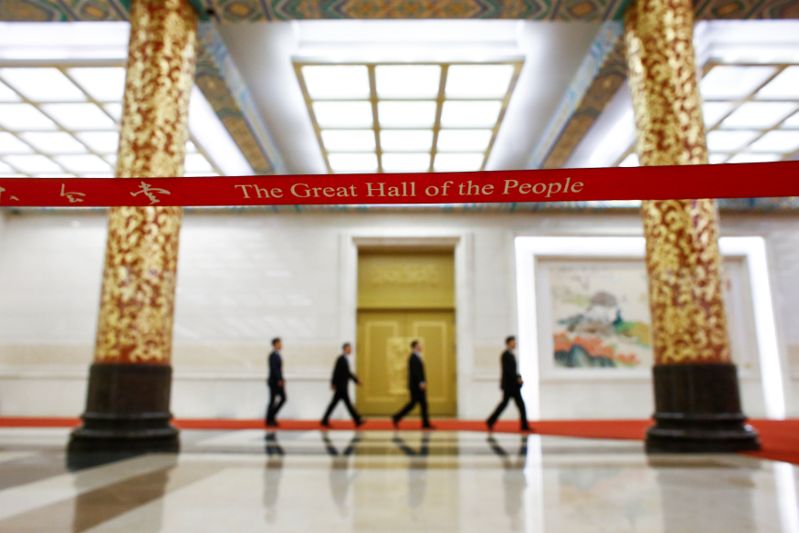
Communist Party spokesman Tuo Zhen and other officials arrive at a media briefing one day ahead of the opening of the 19th National Congress of the Communist Party of China, at the Great Hall of the People in Beijing, October 17, 2017. REUTERS/Thomas Peter
October 17, 2017
BEIJING (Reuters) – Chinese President Xi Jinping on Wednesday opens a critical Communist Party congress expected to cement his authority with a closely watched address signaling how he intends to put that power to use during a second five-year term.
Xi’s speech will kick off the twice-a-decade congress, a week-long, mostly closed-door conclave that will culminate with the selection of a new Politburo Standing Committee that will rule China’s 1.4 billion people for the next half-decade.
Based on previous such gatherings, the opening address will essentially be the reading of a lengthy, carefully drafted “work report” that is high on aspiration and short on specifics.
Much of it is expected to focus on the party’s achievements during Xi’s first term. But its language will be parsed for signals or policy directives, including on the direction of reforms for the world’s second-largest economy.
In leading the drafting of the work report, Xi “personally chaired” six forums “directly listening to suggestions from all sides”, party spokesman Tuo Zhen said at a news briefing on Tuesday. Tuo said the congress would end on Oct. 24.
Since assuming the party leadership in 2012, Xi has consolidated power swiftly, locking up political rivals for corruption, restructuring the military and asserting China’s rising might on the world stage.
Focus on the congress will be on how Xi plans to put his expanded authority to use.
Key questions include whether Xi ally and top corruption-buster Wang Qishan will stay on past traditional retirement age and to what extent Xi will promote allies into senior positions.
Close attention will also be paid to any moves that would enable Xi to stay on in a leadership capacity after his second term ends in 2022, including by resurrecting the position of party chairman, a title that would put him on par with Mao Zedong.
One of the most important signals for that would be whether – or how often – Xi is referred to as “lingxiu”, or leader. That honorific has been bestowed only on two others since the 1949 founding of the People’s Republic of China: Mao and his short-lived successor, Hua Guofeng.
Another key measure of Xi’s power will be whether he manages to have his name “crowned” in the party constitution, elevating him to the level of previous leaders exemplified by Mao Zedong Thought and Deng Xiaoping Theory.
As with other major set-piece events held in the capital, Beijing has been blanketed with security, and coverage in state media has kicked into overdrive.
“China will again attract the attention of the entire world,” the official People’s Daily said in an editorial on Tuesday. “The answers to many questions the international society craves to understand will be revealed.”
(Reporting by Philip Wen; Editing by Nick Macfie)

